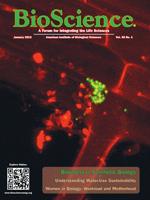Much has been written during the last decades about the rapid decline of biodiversity and its consequences, and many accounts have been given of the reasons to preserve species diversity. Most of these accounts are either focused on trying to demonstrate the intrinsic value of species—a value that all species have, independent of our own human perspective—or, more recently, on demonstrating the utilitarian value of biodiversity—in particular, with respect to the ecosystem services that species provide or support. The Value of Species travels along another line of argument, a line that has been rather neglected so far.
Author Edward L. McCord's main argument for protecting all species on this planet—without regard to their usefulness for us—is that saving species is a question of realizing (in both senses of this word) what it means to be a human being. This is basically an anthropological argument for conservation, albeit one rooted in a long philosophical tradition reaching back to Aristotle. McCord, director of the University Honors College at the University of Pittsburgh, seems to be an ideal person to convey such an argument, having been educated in anthropology, philosophy, and law and teaching interdisciplinary courses in environmental science, inter alia, at Yellowstone National Park.
McCord's personal experiences, his own history as a naturalist (from childhood onward), and his love for nature were the main motivation for writing The Value of Species. He openly admits that he is not just a neutral analyst of philosophical and scientific views on species conservation; he writes as an advocate for the very matter. This explains why the book is not written in a difficult scientific or philosophical language but in a very readable style that can be understood by a broad audience interested in the issue of biological conservation.
Nevertheless, McCord conveys important philosophical distinctions that are often neglected in conservation discourses. One of these distinctions is that protecting species is (mostly) something different from protecting individuals of a species. Whereas a number of ethical arguments for the latter exist (e.g., in terms of avoiding suffering or harm to individuals), it is difficult to argue for the value of species (being classes or lineages) as objects for moral consideration. McCord, however, is interested in demonstrating the value of just this. He argues for the consideration of an inherent value of species, “a value that arises from something that all people should find notable in nature of the thing that is valued, regardless of its practical uses” (p. 7). Many if not most efforts to protect species by means of emphasizing the economic value of nature and ecosystems are seen critically by McCord. One obvious reason for his skepticism is that those species not deemed of practical use to humans are beyond protection with this strategy.
Furthermore, the current system of property values (and its legal implications) and the dominant value of money in Western societies are seen by the author as a decisive force for the accelerated extinction of species. A substantial part of the book deals with this issue, moving deeply into politics and law. However, the most interesting and crucial theme of the book remains the one that McCord states in his introduction: “Beyond seeking legal or economic solutions [for the preservation of species], we must first and foremost resolve the crisis of who we want to be as humans” (p. 5). This perspective points to the very old idea of eudaimonia (the idea of a good, a well-lived, flourishing life as a major goal) and forms the basis of virtue ethics.
The concept of eudaimonia has recently found a kind of revival in ethics and is a promising approach toward orienting human relationships with nature. It appeals to what are the dimensions of good human character and virtue. Avoiding both the endless discourse about direct obligations to nature and the limitations of economic and ecological arguments for conservation, eudaimonia connects directly to the intuitions that most people have about nature. As McCord shows convincingly, such aspects of human character are not just temporary preferences but are basic anthropological attributes, and the main human attribute that he aims at is our essential intellectual curiosity and wonder. The complexity, history, and evolutionary uniqueness of each species, beyond the aesthetics and our practical needs, is unendingly fascinating.
Caring about the continuing existence of all species on Earth is, therefore, in our rational self-interest as real human beings. Contributing to and tolerating the human-driven extinction of species deprives us of our future ability to experience the miracle, wonder, and curiosity that each species bestows on us—an ability that is not only in one's individual interest but is of societal interest to maintain. McCord's approach to the value of species is certainly a promising one that I highly favor. I wonder, however, whether his argument linking intellectual curiosity with species reaches far enough and whether he makes sufficient use of the idea of a “good life.”
McCord's well-written book is a highly recommendable contribution to the discourse on the value of species. It provides inspiring ideas, because the author was willing to travel beyond the current mainstream of the conservation discourse. The whole concept of eudaimonia, applied to human relationships with nature, broadens our perspective in favor of biological conservation and touches on the question of personal identity as it relates to nature—an aspect that still needs to be explored in full.






